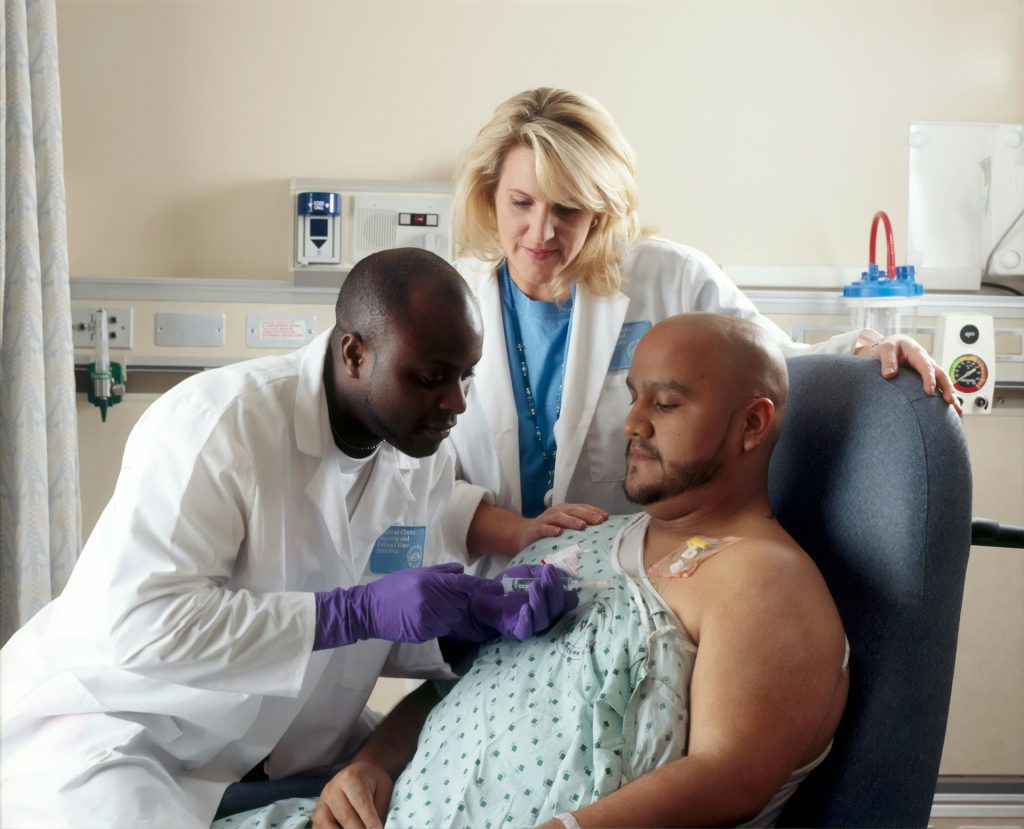The healthcare sector in the United States is one of the largest and fastest-growing industries in the country. With an aging population, advances in medical technology, and increased access to healthcare, medical jobs in the USA are in high demand. For anyone passionate about helping people, solving complex problems, and building a stable career, the medical field offers rewarding opportunities and competitive compensation.
Read Also: How to Write a Job Application in the U.S. (That Actually Gets Read)
Types of Medical Jobs in the USA
 Medical jobs in the USA vary widely depending on education, training, and specialization. Here are some of the most common roles:
Medical jobs in the USA vary widely depending on education, training, and specialization. Here are some of the most common roles:
1. Physicians and Surgeons
Physicians and surgeons diagnose illnesses, develop treatment plans, and perform procedures or surgeries to treat patients. Specializations include cardiology, pediatrics, oncology, and more. These roles require extensive education and licensing but offer high earning potential and job stability. In the United States, doctors and surgeons are among the most esteemed and sought-after medical professionals. They are essential in treating patients, making life-saving decisions, and identifying diseases. Although their profession involves years of study, practical training, and a strong dedication to patient care, the impact they have on people and communities is significant.
Physicians assess patients, order tests, and develop treatment regimens while working in clinics, hospitals, or private practices. Many of them select specialties including family medicine, pediatrics, internal medicine, or obstetrics and gynecology. Each specialty focuses on a distinct aspect of patient health, allowing them to customize their career to their areas of greatest interest. They earn $150,000 – $300,000+ per year.
2. Registered Nurses (RNs)
The capacity of registered nurses to combine compassion and medical knowledge is one of their special talents. Nurses provide a secure and comforting atmosphere for patients and their families, whether they are tending to someone recuperating from surgery, supporting a new mother, or assisting an older patient in managing chronic diseases. Hospitals, clinics, nursing homes, home health agencies, schools, and even corporate wellness initiatives are just a few of the many places where registered nurses work. Additionally, they can focus on fields like cardiac care, pediatrics, oncology, mental health, emergency care, or critical care. Because of this flexibility, they can select a career path that aligns with their abilities and passions. RNs provide patient care, administer medications, monitor vital signs, and educate patients about health management. Nurses work in hospitals, clinics, long-term care facilities, and even community health settings. They earn $60,000 – $90,000 per year.
3. Emergency Medical Technicians (EMTs) and Paramedics
Emergency Medical Technicians (EMTs) are essential first responders in the healthcare system in the United States. When someone is ill, hurt, or in a life-threatening emergency, they are frequently the first medical personnel to arrive. Their rapid thinking, serene demeanour, and medical expertise can literally be the difference between life and death. Emergency medical technicians (EMTs) respond to emergency calls, stabilize patients on the spot, and securely transport them to hospitals for additional care. They handle respiratory issues, perform CPR, control bleeding, evaluate injuries, and offer basic life support. EMTs and paramedics are first responders who provide life-saving care in emergencies. They assess patients, perform critical procedures, and transport individuals to medical facilities. These roles require certification and quick decision-making skills. They earn $35,000 – $70,000 per year.
4. Medical Assistants and Technicians
Medical assistants support physicians and nurses by handling administrative tasks, patient intake, and basic medical procedures. Technicians work in specialized fields like radiology, laboratory testing, or respiratory therapy. In the American healthcare system, medical assistants and medical technicians are vital support personnel. By combining clinical expertise, technical know-how, and outstanding patient care skills, they contribute to the seamless operation of clinics, hospitals, and diagnostic centres. In order to guarantee that patients receive effective and well-organized care, medical assistants (MAs) collaborate closely with physicians and nurses. They might take vital signs, document patient histories, set up exam rooms, help with operations, make appointments, and handle routine administrative duties on a typical workday. They earn $30,000 – $45,000 per year.
5. Specialized Medical Roles
Specialized roles include radiologists, anesthetists, surgical technologists, and physical therapists. These positions often require additional education and training but can offer higher salaries and career growth opportunities. In the United States, advanced healthcare jobs that concentrate on extremely specific aspects of patient care are known as specialized medical roles. These experts go beyond their study in general medicine to get in-depth knowledge in areas such as anesthesia, mental health, heart health, cancer therapy, and more. They can manage complicated medical disorders and offer focused care that general practitioners might not be qualified to handle because of their specialized talents. They earn $50,000 – $100,000+ per year.
Read Also: What Does “Senior Care” Actually Mean in the U.S.?
Skills Required for Medical Jobs
 Success in medical careers requires a combination of technical knowledge, interpersonal skills, and emotional resilience:
Success in medical careers requires a combination of technical knowledge, interpersonal skills, and emotional resilience:
-
Medical Knowledge and Patient Care Skills
Two of the most crucial talents needed for anyone in the medical sector are medical knowledge and patient care abilities. Healthcare that is safe, efficient, and compassionate is built on these abilities. Professionals can diagnose illnesses, identify symptoms, and select the best course of action thanks to their medical knowledge. Physicians, nurses, technicians, and medical assistants all need to be knowledgeable about how the human body functions, how illnesses arise, and how various therapies impact patients. Understanding anatomy, medical procedures, and patient needs.
-
Problem-Solving and Critical Thinking
Critical thinking and problem-solving abilities are crucial for anyone hoping to become a doctor in the United States. Healthcare workers must make prompt, correct decisions that have a direct influence on patient outcomes because these settings are fast-paced and frequently unpredictable. Medical practitioners can uncover the underlying reason for a patient’s ailment, choose the best course of action, and modify treatment plans when circumstances change by using problem-solving techniques. Strong problem-solving abilities are necessary, for instance, when a nurse observes uncommon symptoms, a doctor interprets test results, or an EMT responds to an emergency. Making fast, accurate decisions in emergencies or complex situations.
-
Communication and Teamwork
Collaboration and communication are essential abilities for anyone in the medical industry. In order to deliver safe and efficient care, doctors, nurses, technicians, and support personnel rarely work alone. Errors are avoided and results are improved when there is clear communication about patient status, treatment plans, and any changes in care. It is also important to communicate effectively with patients and their families. Medical practitioners must be patient and empathetic while providing clear explanations of diagnosis, treatments, and drug instructions. Coordinating with colleagues and effectively interacting with patients and families.
-
Attention to Detail
Anyone who wants to work in medicine needs to be able to pay close attention to details. Being thorough and exact is crucial in the healthcare industry since even minor errors can have major repercussions. To provide safe and efficient care, medical personnel must closely monitor patients, accurately document information, and adhere to protocols. Before rendering a diagnosis, for instance, a doctor must carefully study test results, a lab technician must accurately label samples, and a nurse must double-check medicine dosages.
Ensuring accuracy in treatment, documentation, and medication administration.
-
Physical and Emotional Stamina
Due to the often emotionally stressful, fast-paced, and demanding nature of their employment, medical workers must be emotionally and physically strong. Long hours, unpredictable shifts, and the need to act quickly in emergency circumstances all require physical stamina. Doctors, nurses, EMTs, and other medical professionals must be able to stay alert, move quickly, and perform tasks accurately even in physically taxing circumstances. Just as important is emotional stamina. Patients in pain, discomfort, or imminent death are frequently treated by medical professionals. It’s crucial to control one’s own tension and emotions while remaining calm, empathetic, and focused. Managing long shifts, high-pressure environments, and stressful patient cases.
Read Also: Diagnostic Medical Sonographer Jobs in the USA
Education and Certification Requirements
 The educational path varies depending on the role:
The educational path varies depending on the role:
-
Degrees
The majority of medical careers in the United States require degrees and certifications. They guarantee that medical personnel have the education, training, and expertise required to deliver safe and efficient patient care. For instance, a Doctor of Medicine (MD) or Doctor of Osteopathic Medicine (DO) degree is normally required for doctors and surgeons, who must then complete residency training in the specialty of their choice. Some positions require an associate degree (e.g., medical assistants), a bachelor’s degree (e.g., registered nurses), or medical school (physicians and surgeons).
-
Licensing Exams and Certifications
Outline of professional and educational criteria for positions in medicine in the United States. Before giving patient care, they make sure that healthcare professionals fulfil stringent requirements for knowledge, competency, and abilities. For instance, after completing medical school, doctors and surgeons must pass the Comprehensive Osteopathic Medical Licensing Examination (COMLEX-USA) or the United States Medical Licensing Examination (USMLE). These tests evaluate clinical expertise, medical knowledge, and the capacity to make wise judgments on patient care. Similarly, in order to practise safely and lawfully in their state, registered nurses must pass the NCLEX-RN. Nurses must pass the NCLEX, physicians must pass the USMLE, and EMTs must pass the NREMT exam. Specialized roles may require additional credentials.
-
Continuing Education
In order to keep their certificates, knowledge, and abilities throughout their careers, medical professionals in the United States must complete continuing education. Healthcare and medicine are always changing, with new studies, technology, and therapies appearing regularly. Professionals can stay current and give their patients the finest service possible thanks to continuing education. Licensing boards mandate that many healthcare professionals, such as doctors, nurses, technicians, and specialists, earn a specific number of continuing education credits (CECs) or continuing medical education (CME) hours annually. Most medical professions require ongoing learning to stay updated with new treatments, technologies, and regulations.
Read Also: Public Health Jobs in the USA (2025 Guide)
Job Outlook and Career Growth
 The healthcare sector is growing steadily, offering strong job security and advancement potential. Aging populations and increased healthcare access drive demand for nurses, technicians, and allied health professionals. According to the U.S. Bureau of Labour Statistics, employment in healthcare occupations is expected to grow 8–10% over the next decade, faster than the average for all professions. Entry-level roles often serve as stepping stones to higher-paying or specialized positions, such as nurse practitioners, physician assistants, or healthcare administrators.
The healthcare sector is growing steadily, offering strong job security and advancement potential. Aging populations and increased healthcare access drive demand for nurses, technicians, and allied health professionals. According to the U.S. Bureau of Labour Statistics, employment in healthcare occupations is expected to grow 8–10% over the next decade, faster than the average for all professions. Entry-level roles often serve as stepping stones to higher-paying or specialized positions, such as nurse practitioners, physician assistants, or healthcare administrators.
Read Also: Medical Receptionist Jobs: The Reality of Being Healthcare’s Front Line
How to Apply for Medical Jobs
Landing a medical job requires preparation and strategy:
-
Build a Strong Resume and Cover Letter
One of the most crucial tasks in applying for medical jobs in the United States is creating a compelling CV and cover letter. These documents should clearly showcase an applicant’s skills, experience, and qualities that align with the position because they are frequently the first thing a hiring manager or recruiter sees of them. Education, certificates, licenses, pertinent clinical experience, technological capabilities, and any specialized training should all be highlighted in a CV for a medical profession. Highlight certifications, experience, and key skills.
-
Use Job Boards and Networking
Applying for medical employment in the USA can be done successfully via networking and using job boards. In the highly competitive healthcare sector, making connections with the appropriate people and opportunities might be crucial to getting the right job. Candidates can look for medical positions based on geography, specialty, and experience level on job platforms like Indeed, Glassdoor, Health eCareers, and hospital or clinic websites. These platforms frequently offer thorough job descriptions, prerequisites, and application guidelines, making it simpler to find jobs that fit one’s skills. Check platforms like Indeed, Glassdoor, hospital websites, LinkedIn, and attend healthcare career fairs.
-
Prepare for Interviews
One of the most important steps in applying for medical employment in the USA is preparing for interviews. Candidates can show employers that they are capable of delivering high-quality patient care by showcasing their professionalism, expertise, and knowledge during a well-prepared interview. Investigating the healthcare facility or organization is the first step in preparation. It is easier for candidates to customize their answers and demonstrate sincere interest when they are aware of the organization’s mission, values, patient population, and job duties. Be ready to discuss hands-on experience, clinical scenarios, and problem-solving skills.
-
Gain Hands-On Experience
One of the most crucial tasks while applying for medical jobs in the USA is obtaining practical experience. Practical experience is valued by employers because it shows that applicants can effectively manage the demands of patient care and use their knowledge in real-world healthcare settings. Clinical rotations, internships, and externships can provide students or recent graduates with practical experience. Volunteer, intern, or participate in clinical rotations to strengthen your practical skills.
Read Also: Neonatal Nursing Jobs in the UK
Tips for Success in Medical Careers
To excel in medical jobs in the USA, Internships, clinical rotations, and volunteering enhance skills and confidence. It is important that you Maintain Certifications and Continue Learning, stay updated on medical practices and regulations. Build Strong Communication and Teamwork Skills because it is Essential for coordinating care and building trust. Also, manage stress, fatigue, and emotional challenges to perform effectively. Be Adaptable and Professional. Emergencies are unpredictable; flexibility and professionalism are critical.
Read Also: Mental Health Nursing Jobs in the UK
Conclusion
Medical jobs in the USA offer a rewarding, challenging, and in-demand career path. For those passionate about healthcare, helping others, and solving complex problems, these roles provide job security, career growth, and the satisfaction of making a meaningful difference in people’s lives. While the work can be demanding, proper preparation, continuous learning, and strong professional skills can ensure success and long-term fulfillment in the healthcare industry.
